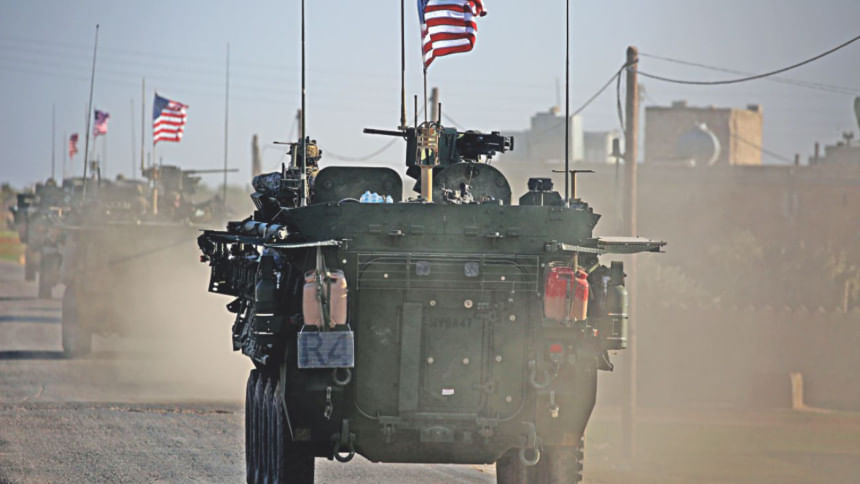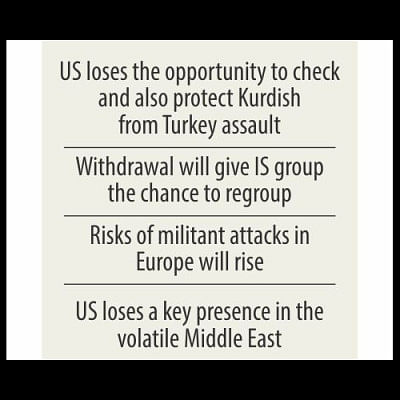Trump's gift to Russia, Iran

It was set to be the most discreet yet potent measure of US influence in the Middle East.
Over 2,000 American special forces in the north of Syria, fighting the fight against ISIS, but also providing a significant bang for their buck.
But to widespread surprise, US President Donald Trump announced on Wednesday that the US intends to rapidly withdraw from Syria.
The troops out there had managed three things to date.
First, they fought IS alongside the Syrian Kurds who run that area of north Syria. The fight was edging towards its end, but was also at a key stage of mopping up potent leadership and denying them the chance to regroup.They could have remained there indefinitely, chasing IS militants in the desert. But for now, their goals were palpable and persistent. IS has been regrouping and the fight was not done. As Charles Lister of the Middle East Institute pointed out, IS issued a claim of responsibility for an attack in Raqqa just ten minutes before Trump's announcement.

Second, they kept the Syrian Kurds slightly in check. This may sound odd, given they are arming and assisting a group of Kurdish fighters that Turkey, the US's Nato ally to the north, considers terrorists. But the truth is that so long as the Americans remained there, the chance of the Syrian Kurds, known when working with their Arab partners as the SDF, attacking Turkey was limited.
Third is the most important part of the US presence, which may be missed the most by Washington's allies. They provided a very forceful and blatant block to Iranian and Russian influence in the present and future Syria.
Iran has been accused of using that stretch of flat, open Syria to send weapons to its partners Hezbollah in Lebanon. That threatens Israel. Iran calls the accusations of their poor behavior in the region "hysterical statements" invented by people wanting to paint Iran as "an imaginary enemy."
Russia was also seeking to improve its and the Syrian regime's standing in the area. The Americans were not messing around: on one February night they may have killed dozens of Russian mercenaries trying to assist Assad's forces in retaking an oil field. These Americans were effective and heavily armed.
And their bases were not temporary structures. The runways were paved, the defenses serious. Nobody expected to be going anywhere. Which leads to this question: why, given the major gains of the presence and its relatively minor numbers, did Trump, the Commander in Chief, do this?
The timing is curious. Turkish President Recep Tayyip Erdogan has for days been threatening to send in his troops to attack and push back the Syrian Kurds allied with the US Special Forces. He sees them as a threat -- explicitly calls them terrorists -- and is under domestic pressure to act tough.
The one thing that has always held him back was the risk that US troops might get caught up in the onslaught.
If they are not there, that risk evaporates. Turkey is a Nato ally and the US's embrace of the Kurds in the IS fight has irritated Ankara and led them to get closer to Moscow. This move may reverse that.
Finally, while the Islamic State group has lost virtually all of its territory in Syria, it is believed to have thousands of supporters who may carry out attacks overseas, often blending into local populations in Europe.
The US withdrawal leaves France, which still has a small contingent of special operations troops in Syria, and Britain, which according to media reports has quietly deployed a number of soldiers.
Former Belgian prime minister Guy Verhofstadt said a US withdrawal would be a victory for Russia, Iran, Turkey, Turkish proxies and the Syrian regime.

 For all latest news, follow The Daily Star's Google News channel.
For all latest news, follow The Daily Star's Google News channel. 




Comments